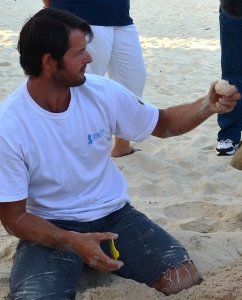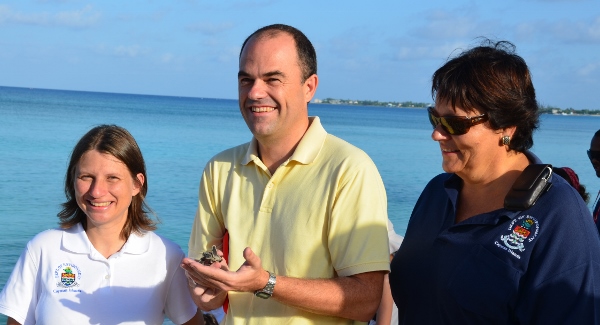Special funding helps DoE help local turtles
 (CNS): Cash that came from the UK and was distributed from the governor’s office is helping the Department of Environment better understand and measure the impact of the Turtle Farm’s release programme on wild the population of turtles nesting in Cayman and improve the level of information and research about green turtles and improve their protection. The funding has allowed the DoE to extend its turtle monitoring programme – particularly at night. The monitoring process involves locating and tagging nesting green turtles with flipper tags and microchips, documenting evidence of CTF tags, and taking genetic samples.
(CNS): Cash that came from the UK and was distributed from the governor’s office is helping the Department of Environment better understand and measure the impact of the Turtle Farm’s release programme on wild the population of turtles nesting in Cayman and improve the level of information and research about green turtles and improve their protection. The funding has allowed the DoE to extend its turtle monitoring programme – particularly at night. The monitoring process involves locating and tagging nesting green turtles with flipper tags and microchips, documenting evidence of CTF tags, and taking genetic samples.
Although the DoE has carried out a comprehensive daytime monitoring survey since 1998 it has previously lacked the resources for intensive night monitoring.
"We sincerely thank the Governor’s Office for their support. The Turtle Farm has released more than 30,000 turtles since 1968 and we needed this funding to track how many are returning to nest in Cayman and to assist in the conservation of our wild turtle populations,” said Janice Blumenthal, a research officer with the DoE.
 The research covers turtle activity on beaches around Grand Cayman and includes conducting a comprehensive study of all turtle nesting activity as well as tagging nesting female turtles to individually identify them and documenting the presence of Cayman Turtle Farm tags.
The research covers turtle activity on beaches around Grand Cayman and includes conducting a comprehensive study of all turtle nesting activity as well as tagging nesting female turtles to individually identify them and documenting the presence of Cayman Turtle Farm tags.
Photo (L-R) DoE Research Officer, Janice Blumenthal; Governor’s Staff Officer, Tom Hines; DoE Director, Gina Ebanks-Petrie gather to observe a new turtle hatchling
The DoE is also collecting tissue samples from nesting green turtles for future analysis, increasing its enforcement presence on beaches at night to reduce illegal take, as well as intervention and public education to reduce the impact of light pollution on nesting females and emerging hatchlings.
Commenting on the grant from the Governor’s Office, Staff Officer Tom Hines said it was a well-deserved project.
“This year we received many good bids for funding. However, deciding to support the Department of Environment’s bid was easy because it was well-written, focused on making an impact, and aligned with one of our priorities to preserve the biodiversity in the UK and the Overseas Territories. This project will do just that,” he added.
The DoE began local turtle monitoring in 1998 with assistance from the UK Government. Since then, the programme has grown significantly and is now a leading one in the region.
Category: Science and Nature


WHAT ABOUT THE N.C.L.??????????????????
As someone who pays taxes to the UK via property income, I am saddened that any money is spent assisting a place that breeds turtles for food. The UK should be putting an end to such barbarism.
Question, what is it you object to?
a) animal farming
b) farming of turtles in particular (but other animals are OK)
c) husbandry practices at the Cayman Turtle Farm
Thanks for your time for a thoughtful answer.
I am not "Anonymous" 18:53, but I can give you my opinion. I am against turtle captivity, and I am also against dolphin and whale captivity, likewise captivity for any creature that normally lives in the wild. This includes zoos where animals are confined. Turtles and dolphins are far-roaming creatures of the sea. I believe that is where they should be. Is it O.K. for me to have this opinion?
Well said, although without some responsible zoos the worlds critically endangered species would disappear altogether.
However, there is a world of difference between responsible breeding programmes and the inhumane confinement of wild animals. Cows are rarely confined unless it is to protect them from severe weather of where food is short, the same can be said for many other meat producing animals. It is a matter of choice and conscience whether you choose to eat battery farmed chickens or eggs, and even this industry has taken a hit by more discerning consumers.
Unfortunately, until new laws are implemented giving conservation enforcement staff the power to investigate all reports of cruelty to any animal on the Cayman Islands, then changes in attitude and behaviour are never going to change.
The point being that you don't have to be a veggie to object to the cruel and inhumane treatment of any animal. But do you do have to look further than your stomach, and in the case of the Turtle Farm, well you also have to question whether as a country you can afford the millions in subsidies that it takes to provide for so few.
and what about human captivity? When are you going to do something about that? Jails and slavery…the list does not end. But from your point of view that is ok as long as the animals are alright. What a screwed up world.
As a UK taxpayer living in the Cayman Islands I cannot think of a more worthwhile project than the breeding of turtles for the replenishment of open ocean breeding stocks. Whilst it is true that the Turtle Farm is involved in the project, there is a marked difference between the inhumane 'farming' of turtles for meat and the breeding of hatchlings for release.
Turtle meat is a minority dish and oversubsidised to the tune of millions of dollars per year. It cannot be too long before the CIG wake up and stop paying ridiculous amounts of cash to pander to so few consumers.
Then maybe with a little more help the 'farm' could end up being a place of environmental excellence instead of barbaric suffering.
Why is it that vegetarians feel they have the right to tell others what to eat?
You want to eat leaves, that's your business. Me, I'll be eating a plate of turtle meat for lunch on Friday. Delicious.
Why is it barbarism to breed turtles for food( I do not eat it) but it's ok to raise cows, chickens, sheep, goats etc. for food ?